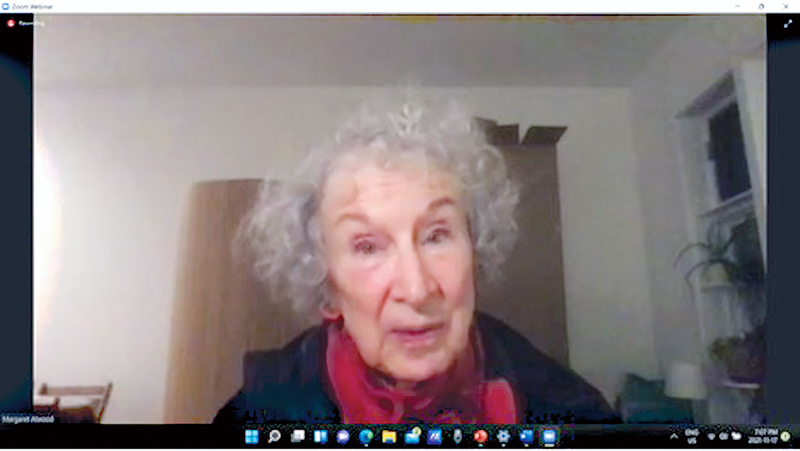SDG Library celebrates 50th anniversary
Margaret Atwood
Courtesy Photo
CORNWALL – To celebrate the 50th anniversary of the SDG Library, renowned Canadian author Margaret Atwood joined CBC Radio One’s Alan Neal for a live but virtual interview last week.
“Hooray for libraries. Where would we be without them,” Atwood said.
On Nov. 17, the day before Atwood’s 82nd birthday, registered guests signed into the Zoom webinar, which began with a little live music by Nicholas Seguin. Organized by SDG Librarian Charlotte Halstead, it was director of library services Karen Franklin who welcomed viewers to the momentous event. Shortly past 7 p.m., Neal joined the conversation, ready to interview Atwood when she logged onto the webinar to talk books, writing, research, critics, technology, age, bias, and more.
“Finish the book,” Atwood said when asked about what advice she has for young writers today. “Don’t throw anything out, it might come in useful later.” With roughly 90 people tuning in for the interview; several included local high school students who had pre-submitted questions for the famous author. To get used to writing and having an audience, Atwood suggested using Wattpad (wattpad.com), a social storytelling platform with a global community of roughly 90 million readers and writers.
Neal asked Atwood how things have changed in the literary world. She said it was a different age in the late 1960s and early 1970s. The context was different. In 1971, she said only five books had been published in Canada. Atwood said the bar for success at that time was low, with success being a published book. It was an age when writers didn’t have agents, and they didn’t know what should be included in a contract.
“To be a writer you had to be slightly a lunatic,” Atwood said.
Atwood reminded viewers that when she started her career, she typed her manuscripts on a typewriter. Manuscripts had to be packaged, posted, and sent out physically to potential publishers. The big names in writing were “pretty much” men but this began to change in the 1970s, she said.
“Nobody thought six-figure contract. We just didn’t think in those terms at all,” Atwood said. “The good thing then was there wasn’t much competition.”
Atwood discussed changing perspectives. In her late 20s, for example, Atwood said she was teaching a university course in Victorian literature. She had classes with young people and classes with adults, both reading and discussing the same novel. What the young people disliked about the novel, she said, was usually what the adults loved about it, showing a very clear difference in perspective from one age group to another.
“Things change over time,” she said. “Books you liked change over time.”
Atwood answered every question Neal sent her way, and then some. She said she still works a lot. She does at least six takes before finishing a novel. Writing like life, can cause emotional upheavals but it’s not a reason to stop writing.
“It’s a normal sort of thing that happens to writers,” Atwood said. “You just have to write on through.”










